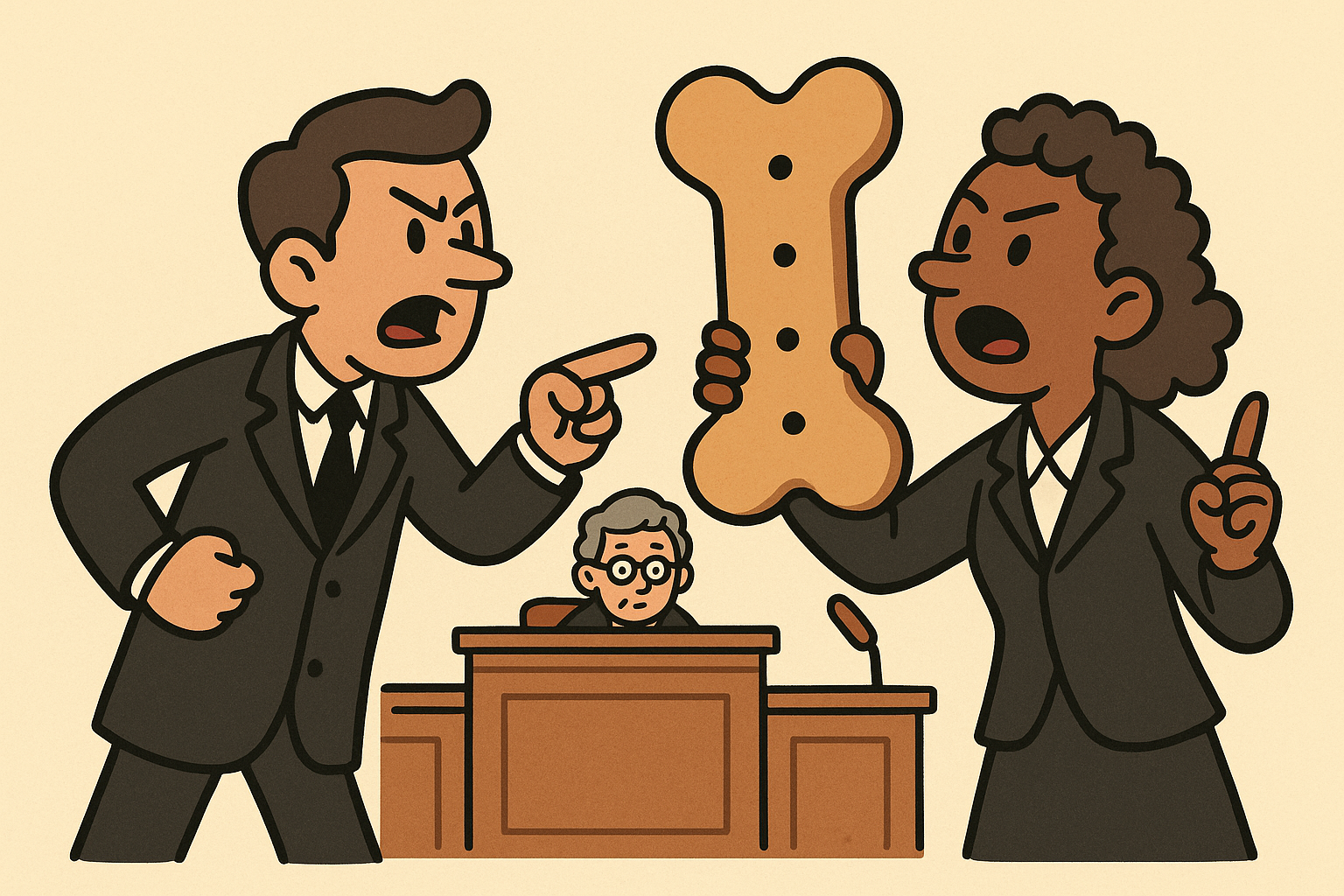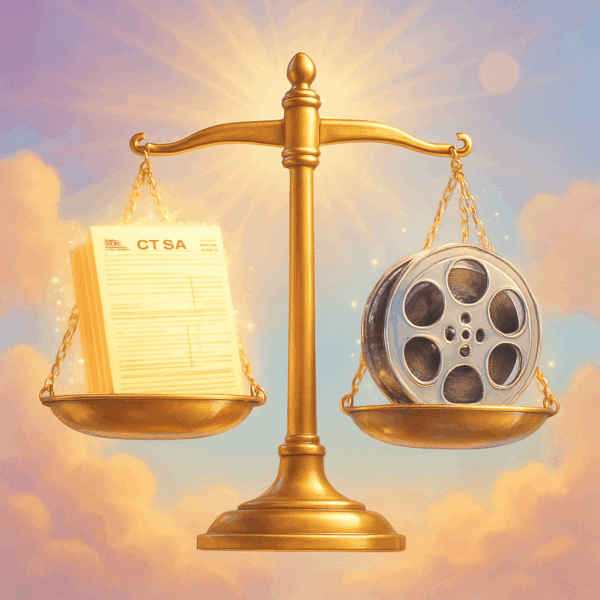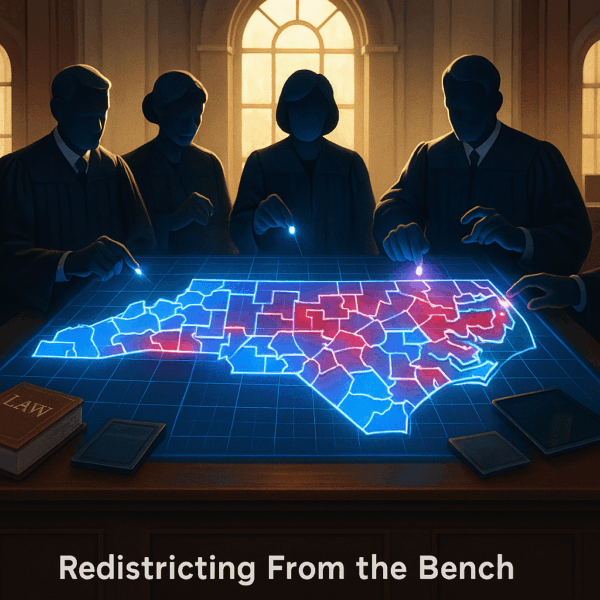
How Moore v. Harper May Have Saved the Constitution from a Rogue Theory
By TheOneLawFirm.com Contributors
“The Elections Clause does not insulate state legislatures from the ordinary exercise of state judicial review.”
— Chief Justice John Roberts, Moore v. Harper (2023)
🧭 Visual Case Brief: Moore v. Harper (2023)
| Case | Moore v. Harper, 600 U.S. 1 (2023) |
|---|---|
| Issue | Independent State Legislature theory under Elections Clause |
| Court | U.S. Supreme Court |
| Majority | Roberts (joined by Sotomayor, Kagan, Kavanaugh, Barrett, Jackson) |
| Decision | Rejected ISL theory; affirmed state court oversight |
| Legal Keywords | Elections Clause, judicial review, federalism, redistricting, state constitutions |
| Filed By | NC State House Republican leaders |
| Decided On | June 27, 2023 |
🎯 The Wild Theory That Almost Became Law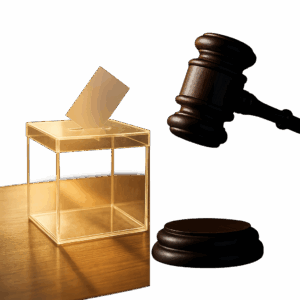
Imagine a world where a state legislature could create election laws without any constitutional oversight—not from governors, not from courts, not even from voters. That dystopian idea isn’t a fictional subplot. It was the heart of Moore v. Harper, a 2023 U.S. Supreme Court decision that rejected the Independent State Legislature (ISL) theory, a once-fringe concept that almost became the law of the land.
The case originated in North Carolina, where a Republican-controlled legislature pushed through a congressional redistricting map so skewed it would have handed the GOP 10 of the state’s 14 House seats—despite a nearly 50/50 political split. The state’s high court struck down the map under North Carolina’s Free Elections Clause. In response, the legislature appealed, arguing that only the legislature—not state courts—could control federal election rules under the U.S. Constitution’s Elections Clause.
The argument was bold. Too bold.
⚖️ What the Court Actually Said
In a 6–3 ruling, the Supreme Court rejected the ISL theory. Chief Justice John Roberts, writing for the majority, emphasized that state legislatures are created and constrained by their own constitutions. That means state courts can review—and even strike down—election laws if they violate state constitutions.
Yet, in classic Roberts fashion, the opinion walked a tightrope. The Court warned that state courts don’t have “free rein.” If a state court ruling “transgresses ordinary bounds of judicial review,” federal courts might have a say. Justice Kavanaugh, in concurrence, nodded toward Bush v. Gore for a standard: state courts must not “impermissibly distort” state law.
The bottom line: legislatures don’t get total control, but state courts don’t get a blank check either.
🧠 Why Constitutional Lawyers Should Care
The ruling preserved judicial review in election law, reaffirming that state constitutional rights still matter, even in federal elections. Without this decision, partisan gerrymandering could have gone unchecked, voting rights could have been steamrolled, and redistricting commissions could have been rendered powerless.
But this wasn’t a clean kill of the ISL theory—it was a regulation, not a burial.
That leaves open a troubling gray area. If a state court goes too far in interpreting its constitution—for example, creating a brand-new right that affects federal elections—the U.S. Supreme Court may intervene. The threshold is unclear. But litigation is inevitable.
🗺️ Legal Fallout: Trends and Forecast
| Trend | Implication for Legal Practice |
|---|---|
| State court legitimacy affirmed | State constitutions remain a solid basis for redistricting and voting cases |
| Federal limits hinted at | Future cases may test what counts as “ordinary bounds” of judicial review |
| Hybrid litigation emerging | Dual battles in state and federal courts likely in 2024 and beyond |
| Gerrymandering scrutiny intact | State courts still key forum to challenge election maps |
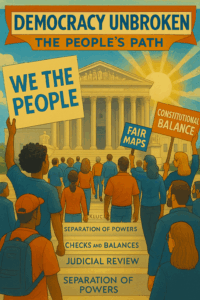 🔎 Election Law Isn’t Just About Elections Anymore
🔎 Election Law Isn’t Just About Elections Anymore
The reverberations of Moore v. Harper stretch far beyond redistricting. This decision touches on federalism, separation of powers, and the role of state constitutions. It’s a map for every future election-law battle, and it redefines how lawyers think about the interaction between federal and state authority.
Election lawyers now must be experts in state constitutional law, while also anticipating federal scrutiny. Expect more dual-track litigation, more constitutional claims, and more emergency applications to the U.S. Supreme Court in the heat of election seasons.
“Moore doesn’t close the door—it builds a new hallway,” said one constitutional scholar. “And everyone’s trying to guess what’s at the end of it.”
🧾 What Lawyers Should Do Now
If you’re practicing in constitutional or election law:
Reinvest in state constitutional law arguments. They remain potent tools for litigation, especially post-Rucho.
Ground your theories in precedent and text. The more novel your interpretation, the more you risk Moore-based challenges.
Prepare for fast-track appeals. Future cases may be litigated in both state and federal court simultaneously.
Monitor how lower courts cite Moore. It’s already being invoked in gerrymandering, voting, and even campaign finance cases.
⚖️ Final Word
Moore v. Harper was a constitutional crisis narrowly avoided. The Court preserved the balance of powers—this time. But it left behind a new legal battlefield where federal and state courts may increasingly clash over the shape of democracy.
For constitutional lawyers, this is both a victory and a warning.
The elections of 2024 and beyond will not just be political contests. They will be constitutional showdowns, and Moore will be Exhibit A.
📚 Endnotes
Moore v. Harper, 600 U.S. 1 (2023).
SCOTUSblog, “Supreme Court rules against North Carolina Republicans over election law theory,” June 27, 2023.
Brennan Center for Justice, “Moore v. Harper, Explained,” updated July 2023.
Center for American Progress, “Supreme Court’s Decision in Moore v. Harper Is a Win for Democracy, But Some Questions Remain Unanswered,” July 2023.
Bush v. Gore, 531 U.S. 98 (2000) (Rehnquist, C.J., concurring).
National Association of Attorneys General, “Case Summary: Moore v. Harper,” July 2022.
Common Cause, “Statement on Supreme Court Ruling in Moore v. Harper,” June 27, 2023.
Amy Howe, “Justices will hear case that tests power of state legislatures to set rules for federal elections,” SCOTUSblog, July 2022.
Penn Today, “Five takeaways from Moore v. Harper,” University of Pennsylvania Law School, July 5, 2023.
Would you like this article formatted in clean HTML for WordPress publishing next?


